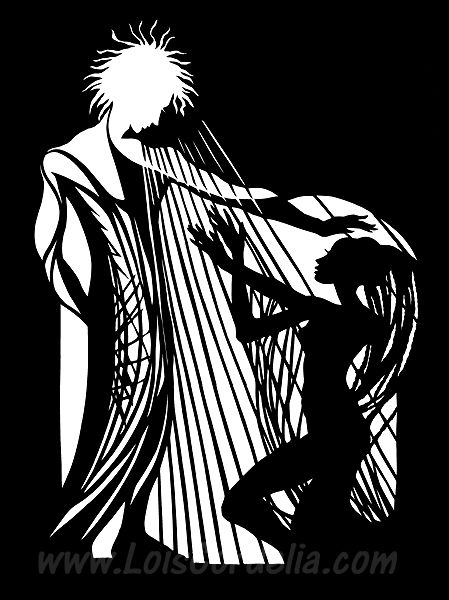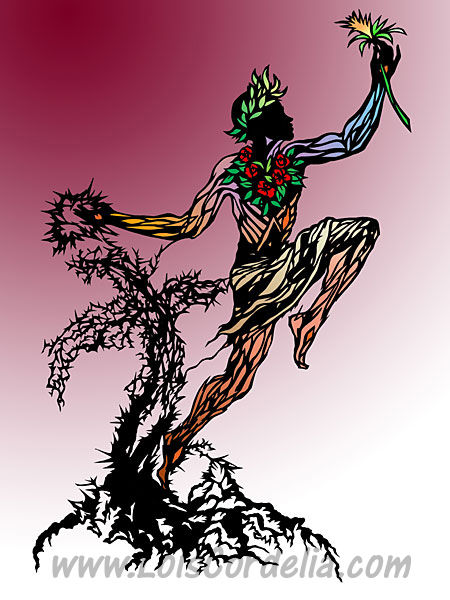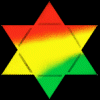











 |
Iyesus Kristos (Jesus Christ)
The Rastafarian movement is immensely diverse,
and so it would be fairly meaningless to speak of a
single Rastafarian 'definition' of Jesus Christ. It is
not within the scope of this short article to give
anything more than a brief summary of a very complicated
picture. The only real way to gain a comprehensive grasp
of the diversity of Rastafarian views of Jesus is to
listen to Rastas themselves.

Some are happy to accept Jesus as divine saviour
and Son of God. Some accept the doctrine of the Trinity,
seeing God as mystically Three in One
(Father, Son and Holy Spirit). Some believe Emperor Haile Selassie was a reincarnation of
Jesus Christ, in which case the historical distinction
between Jesus and Selassie sometimes becomes almost
totally blurred. Some believe that Jesus was a
Black Ethiopian himself. Some, perhaps tired of
such a confusing array of conflicting opinions, reject
Jesus, seeing Haile Selassie as the saviour, and
sometimes believing him to be an incarnation of God
Almighty.

In any case, Rastafarians have fairly comprehensively
rejected the all too familar blonde, blue-eyed image of
Jesus. It seems to be a universal phenomenon that people
portray Jesus as one of their own kind,
and Black dreadlocked Rastafarians are no exception. This
has given rise to the 'Jesus Dread'
tradition, which has interestingly been adopted also to a
large extent by White Rastas. On a related theme, it has
often been claimed that Jesus was a Nazirite, and therefore did not cut his
hair, though this is probably based on a confusion with
the word 'Nazarene'. (See for example the songs 'Dreadlocks Nazarene' by Prince Alla, and 'Rastaman' by Bunny Wailer.)
In the various branches of Rastafari, there may be more
or less emphasis on Jesus, though in most cases, Jesus
and Selassie have at least in some way been closely
linked as 'types' of christ. Especially
where they are seen as effectively one and the same, this
gives rise to often heated debate regarding the supposed 'divinity'
of Haile Selassie. It soon becomes evident that there is
no single definition of 'divine'. Modern Christianity has
usually tended to emphasise the gap between an immortal
infinite God and mortal finite human beings. Hence, the
idea that an ordinary human being could ever be called
'divine' has mostly been dismissed as heresy
or blasphemy in the west. However, it is
interesting to see ancient ideas re-emerging in modern
culture, quite possibly influenced by the more fluid
notions of divinity that characterise some eastern
religious traditions, notably the concept that all human
beings are 'divine' in some sense.
Among those who accept Jesus as the saviour, the Twelve
Tribes of Israel (TTOI) consider that Jesus is indeed the only
saviour, and though Haile Selassie may be a 'christ-like'
figure, it would be idolatry to worship
him. Often the phrase 'the same spirit but
different flesh' is used to highlight the
distinction. Members of the TTOI tend to adhere more
closely to an orthodox interpretation of Scripture, and
may be baptised in the name of Jesus Christ,
much as in mainstream Christianity.
At the other end of the spectrum, there are many Rastas
who understandably consider that Jesus has been too far
monopolised by a typically White western Christian
Church. They are not alone in feeling deep rooted
resentment towards the institutionalised Church, due to
centuries of corruption, hypocrisy and association with
innumerable crimes that have been committed against
humanity ironically 'in the name of Jesus Christ'.
Hence some Rastafarians reject Jesus
entirely, or at least seek to divorce him from such
tainted connections.

According to scriptural genealogies, Jesus was a true Jew
belonging to the tribe of Judah, and a descendant
('root') of the Davidic line of monarchs. Hailed as the King of kings and Lord of
lords
(1
Timothy 6:15, Revelation 17:14, and Revelation 19:16), and the Lion of the Tribe of
Judah (Revelation
5:5), Jesus was
believed by the early Christians to be the heir to the
throne of the 'Spiritual Israel' and hence of the kingdom
of God.
Often you may hear different forms (and spellings) of the
name of Jesus used in Rastafarian circles, including most
commonly his Amharic (Ethiopian) name Iyesus,
which corresponds very closely to the Greek
version Iesous, but also his Hebrew
or Aramaic name Yehoshuah
(sometimes shortened to 'Yahshuah' or 'Yeshuah',
equivalent to modern English 'Joshuah'), or less commonly
also the Arabic name `Aissa (sometimes
spelled `Eesa). Increasingly, people seem to prefer these
'more authentic' versions of the
saviour's name, considering the anglicised 'Jesus' to be
a weakened and inferior shadow of the original name,
which reputedly had the power to cast out demons and
perform miracles of healing by the power of his
authority.

Back to 'Key Biblical Concepts
In Rasta Reggae Lyrics' page

|

